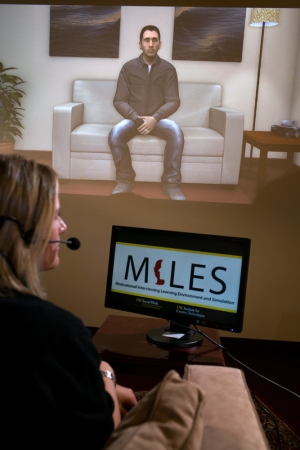Virtual Teaching Tool Schools Students in Helping Veterans
September 23, 2013 / by Claudia Bustamante- Research
Mike Baker sits on a therapist’s couch—in blue jeans and a buttoned-down shirt, nervously clutching his hands.
Baker was deployed to Afghanistan with the National Guard a year ago and is now having trouble at home. His wife made him get help, but talking is the last thing on Baker’s mind.
“I know this is your job to ask me a bunch of questions, but let me ask you something,” he said. “Did you ever serve?”
Luckily, there is no wrong answer for the behavioral health therapist or social work student. Mike Baker does not exist. He is a virtual avatar developed by the Center for Innovation and Research on Veterans & Military Families at the USC School of Social Work meant for the practice of key counseling principles.
Motivational Interviewing Learning Environment and Simulation (MILES), created in partnership with the USC Institute for Creative Technologies, provides graduate students with an interactive and virtual setting for the practice of motivational interviewing, an evidence-based counseling approach that helps clients explore and resolve ambivalence.
This innovative teaching tool allows students to become skilled in core concepts of therapy without the fear of alienating a veteran, active service member or military family member.
“If you’re going to say the wrong things, we’d rather you say it in a classroom than with an already vulnerable population,” said Nathan Graeser, project specialist with the center and military-subject expert on MILES.
The Invisible Toll of War
Since 2001, more than 2.6 million troops have been deployed to Iraq and Afghanistan. Their reintegration back into civilian society can often be met with difficult transitions, such as post-traumatic stress, depression, relationship and health challenges.
Numerous research studies suggest the suicide rate among active duty military personnel and veterans is related to mental health and substance abuse issues. Moreover, data also highlights that a substantial percentage of service members do not seek out mental health treatment, and those who do, rarely return.
“Learning to build a relationship with a veteran is a skill,” Graeser said.
The mission of the center and school’s military social work program is to destigmatize mental health treatment and train students to work with veteran and military populations by creating a culturally competent future workforce.
Practice Makes Perfect
The MILES platform, which debuted earlier this year, offers a practical approach to ensure students have grasped these concepts. In MILES, one student enters a virtual clinic and interacts directly with Mike Baker by choosing one of three possible answers based on his responses. In an adjoining classroom, other students can choose their answers.
Jeffery Wilkins, the center’s senior scientist and a board-certified psychiatrist, said MILES has the opportunity for multiple paths and thousands of discussions. In fact, students can purposely make mistakes to see how it will react. After three poor choices, Baker could leave the session.
“You can do book learning, but it’s a whole other thing to practice and apply it,” Wilkins said.
As MILES rolls out, the center will also be conducting a yearlong evaluation of the program. Starting this semester, each first-year Master of Social Work student will go through MILES, along with those students who have declared the military sub-concentration. Early results show that even after one session, students are showing increased confidence and military cultural competency.
The use of role play and standardized patients (where actors simulate problems) are well-established tools in the field, but they have their shortcomings, Wilkins said. The feedback is subjective, and it’s difficult to replicate the experience. MILES provides a standardized approach.
“The goal is to get veterans and service members to create their own motivation, and the way you instill that is through open-ended questions, reflective statements and not pissing them off,” Wilkins said.
Then, how could a student answer Baker’s question without upsetting him?
Graeser, who also works as a chaplain in the California Army National Guard, said that bad responses include “No, but I know people who have” or “No, but I can relate.”
“You’re not answering the real question at that point,” he said. “The real question is can I trust you and is this a safe place.”
A motivational interviewing response could be “It sounds like it is important that I understand your experiences.”
To reference the work of our faculty online, we ask that you directly quote their work where possible and attribute it to "FACULTY NAME, a professor in the USC Suzanne Dworak-Peck School of Social Work” (LINK: https://dworakpeck.usc.edu)
